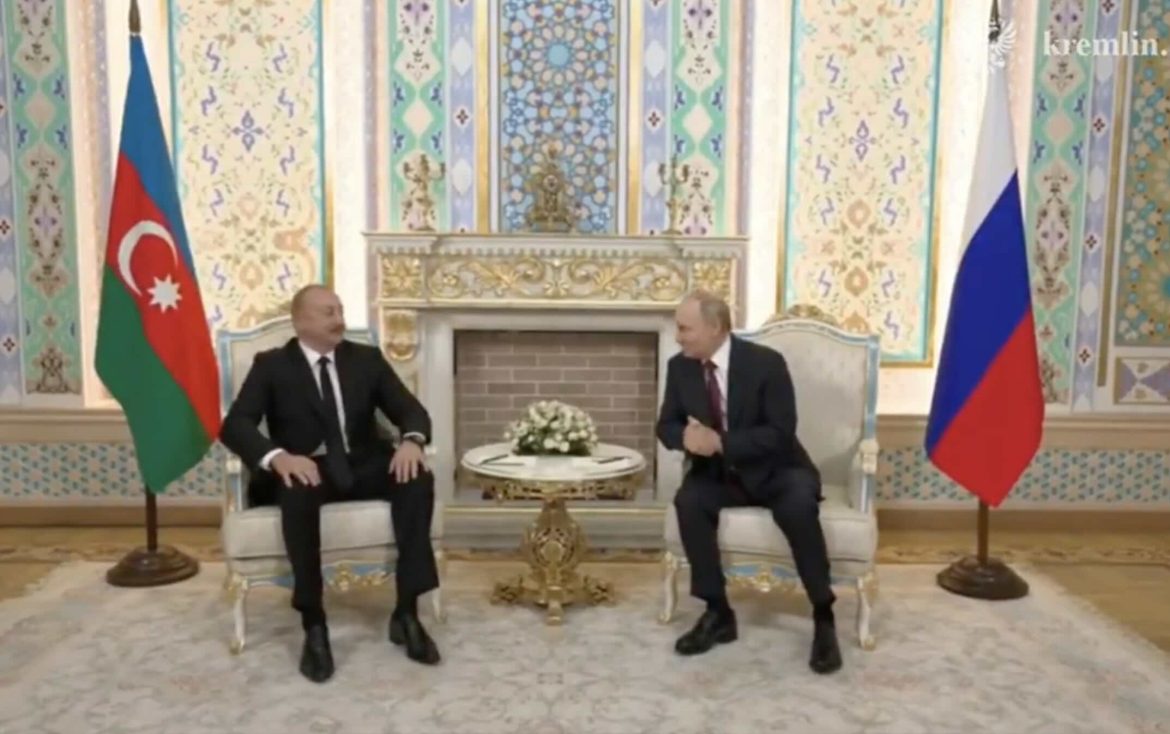On 9 October 2025 in Dushanbe, Russian President Vladimir Putin publicly acknowledged that Russian air-defence units were responsible for downing an Azerbaijan Airlines Embraer 190 in December 2024, an incident that killed 38 people.
Speaking alongside Azerbaijan’s President Ilham Aliyev on the margins of a regional summit, Mr Putin described the crash as the result of a technical failure within Russia’s air-defence system and pledged compensation to victims’ families. It was his first explicit admission of responsibility after months of ambiguity.
The aircraft, operating as Azerbaijan Airlines Flight 8243 from Baku to Grozny, was damaged over Russian territory and crashed near Aktau, Kazakhstan, during an attempted diversion. Twenty-nine people survived. Initial reporting and subsequent investigations in both countries had pointed to the likelihood that a Pantsir-S1 system detonated a missile close to the Embraer as Russian forces engaged Ukrainian drones operating in the region.
In his remarks in Dushanbe, Mr Putin said Russian missiles detonated near the civilian aircraft while targeting a drone and attributed the shoot-down to a malfunction, indicating that a formal legal assessment would follow. He added that those responsible would be held to account and that Russia would provide redress. Mr Aliyev thanked his counterpart for the investigation but had earlier criticised Moscow’s initial handling of the case.
The 25 December 2024 disaster immediately strained relations between Moscow and Baku. Within days of the crash, Mr Putin telephoned Mr Aliyev to express regret for what he then called a “tragic incident” in Russian airspace, but he stopped short of conceding fault. Azerbaijani officials, however, stated that a Russian air-defence unit had fired at the jet, and President Aliyev later said publicly that the aircraft had been unintentionally shot down, calling on Russia to acknowledge responsibility, punish those culpable and pay compensation.
Reporting from the time of the accident indicated that the Embraer—tail number 4K-AZ65—encountered jamming around Grozny amid poor visibility. Passengers and crew then experienced an explosion and shrapnel penetration before the crew attempted to divert, ultimately losing hydraulic power before crashing near Aktau. Kazakhstan’s emergency services confirmed 38 fatalities and 29 survivors. Aviation safety databases and regional outlets noted parallels with previous wartime shoot-downs of civilian aircraft, although investigators stressed the need to separate speculation from verified technical findings.
Mr Putin’s statement in Dushanbe marks a notable shift from the Kremlin’s earlier posture and appears aimed at stabilising a bilateral relationship important to both countries’ energy and trade corridors. Azerbaijan has maintained pragmatic ties with Russia while deepening cooperation with Turkey and other partners; Russia, meanwhile, has sought to retain influence in the South Caucasus and Central Asia amid the ongoing war in Ukraine and expanded sanctions. The leaders’ meeting took place alongside a wider summit at which Mr Putin urged closer economic links with Central Asian states.
Domestically in Russia and across the region, the case has carried legal and political implications. Russian investigators have faced questions over decision-making protocols on the night of the incident, including whether a “Carpet” (airspace closure) procedure was in force and whether the flight was refused permission to land at nearby Russian airports after sustaining damage. Open-source timelines and media reports in Kazakhstan and Azerbaijan have referenced command-and-control shortcomings, but definitive conclusions about the chain of command have not yet been published by Russian authorities.
For Azerbaijan, the admission provides a formal basis for claims and compensation that Baku has pursued since late December. Mr Aliyev’s government has pressed for accountability, including disciplinary or criminal measures where appropriate. For the families of the victims—Azerbaijani nationals and other passengers—the Dushanbe statements could open the way to financial settlements and, potentially, to more detailed public disclosure about the circumstances of the shoot-down.
The Dushanbe acknowledgement also sits within a wider regional security context. The war in Ukraine has expanded the use of long-range drones and air defences across a broad geography, complicating civilian aviation near conflict-adjacent airspace. Aviation analysts and safety bodies have repeatedly cautioned airlines and regulators about evolving risk profiles and the need for real-time coordination between military and civil authorities. While the technical specifics of the Flight 8243 case remain the subject of official inquiry, Mr Putin’s statement narrows the range of disputed facts and signals a willingness to resolve outstanding issues with Baku.
Further announcements are expected from investigative and judicial bodies in Russia and Azerbaijan on the allocation of responsibility within the air-defence chain, the status of any prosecutions, and the timetable for compensation. Both leaders indicated in Dushanbe that they intend to restore practical cooperation after a period of tension, while acknowledging the scale of the human loss from the December 2024 crash.
Azerbaijan Accuses Russia Over Downed Aircraft and Demands Accountability


